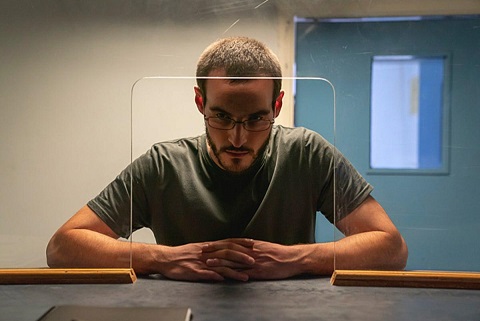
Timothy Spall as Larry Farquhar and Anne Reid as Ann Moore-Martin
In the comments, for comparison: When Harry Met Sally! — how to be a prisoner of genre and not care, two hours of it, and while below is how to use and transcend and stay within a genre …
Dear friends and readers,
I confess I have succumbed to watching nightly different movie stories from the vast array of mystery-thriller, spy, and now “true crime” stories that fill the streaming and mainstream channels of what passes for major TV and computer entertainment fare. My excuse has been I’m studying this genre and finding it worthwhile. If needed, beyond books and essays, there are excellent documentaries on the form, among them, Andrew Marr’s, which I summarized here some years ago (!)
Well about a week ago I found myself reading my daughter’s (full disclosure) blog-review of the coming British films available on American TV and channels and was drawn to one of her colleague’s discussion of The Sixth Commandment Timothy Spall is one of the great character actors of our era (e.g., Mr Turner),and I was interested because Sarah Phelps, the script-writer is a woman who has made Agatha Christie adaptations that are much better than the original books. I’d noticed Saul Dibb as the director of fine films too. Anne Reid I first saw as the housekeeper and Sergeant George’s mother in Andrew Davies’s Bleak House; then she held her own throughout the recent Sanditon as one of Jane Austen’s harridans whom Davies gave more humane depths to.
But I was not prepared for how stunningly moving and humane this one is. As art and deeper message, this serial is about as good as any film you’ll find anywhere. Lucy Mangan (in The Guardian) replays the themes Lucy Braugher discussed (just above) for PBS, only with greater subtlety and appreciation of how this differs from most of these “true crime” stories: the emphasis is not only on the victims and their families and friends; the movie accords intense respect towards the frail elderly repressed and lonely homosexual man and the naive elderly unmarried woman attached to her niece and her dog. It takes us beyond categories many people might be likely to turn from, or ridicule: It is “harrowing” (as Mangan says) and perhaps I feel a little uncomfortable in recommending what might seem morbid or voyeuristic matter (which I have to admit seems to be part of many of the more contemporary of these violent and sometimes frightening or anxiety-producing genre shows) but here the point is to remember what these real people were. It is form of honoring them.

Eanna Hardwicke as Ben Field when taken into custody
It is also to show us what evil is, that a man (or woman) can be evil: malevolent, at core malicious, predatory, and perceptive about other people’s needs, Ben Field (Eanna Hardwicke) is also central to why this film is important: it does not psychoanalyze him into a figure we can sympathize with, but leaves us with an Iago-like character. The trial scenes are fascinating because this seeming religious man boasts about what he did to these people. Some of the reviews that have been harsh have been angry at the attention paid to this cruel man but they have misunderstood or underestimated the full purpose of the film-makers. Louisa Mellor (Den of Geek) is one of those who does justice to the terrifying Field (who wanted to humiliate and play with these people beyond killing them)
Other cast members or characters add quietly to, or thicken the terrain. Peter’s brother and sister-in-law are played by Adrian Rawlins and Amanda Root, and we watch a slow build-up of suspicion allayed, and then increasing horror and profound anger as they realize what happened to their beloved friend. Conor MacNeill, the masochistic friend or scout-stooge somehow under the power of Field, adds intense pathos but also dread. The ferocity of Ann Moore-Martin’s niece (apparently orphaned and very close to her aunt), Annabel Scholey as Anne-Marie Blake, whose marriage almost breaks up as she lashes out at everyone because of her own guilt in not rescuing her aunt in time to save her life. Possibly this shot of Rawlins and Root as ordinary people captures something of the quality sought for these surrounding characters.

There was a slow careful build-up of tension, worry that something is wrong here, and when at the close of the first episode we realize that Ben has been lying and has now gotten the property and probably murdered Ben, the second part has to draw us in in a new way: we are led to see what’s happening through Anne-Marie’s deep distrust and attempts to take action against Ben. We are upset when before she dies, Anne is so angry with herself, ashamed of how her vanity and need led her to be taken in. The third episode we are eager to see Ben arrested so are watching as the detectives in the police procedural fashion gather evidence, and finally have enough. The fourth we are on edge lest the jury decide wrongly.

I feared Ben would topple the unsure Peter — and thought to myself, he won’t for he wants the money …
Andrew Marr is determined to make a case for respecting this form of novel and film. Possibly the finest use of a film like this is it does that. Look at the stills of the two actors playing Farquhar and Moore-Martin: we have lost these precious people. All these melodramas are socially realistic stories, where writers, as Val McDermid says, are tackling “the terrible things that happen in the real world.” They lead us to address death and violence through a complex moral dimension provided by the author. The different consolation that modern detective fiction offers (as opposed to older fiction say pre-ancien regime), Marr contends, is found in the individuals willing to bring to light to stop some horrible behavior on our behalf (ultimately): the good and caring man or woman who is the detective, police officer, the lawyer who carries the weight of bad world on themselves, often at the expense of living a life of their own, or because they haven’t managed to integrate into the social history we are experiencing. Our beloved Foyle, Peter Wimsey, Jane Tennison.
This one does differ from Marr’s archetype because the detectives play a secondary role, do not emerge as individuals any more than the brilliant lawyers who expose Ben Field do. The camera, the impersonal POV replaces this individual. Ann-Marie is told at the end that it was she who started the action that eventually put Ben Field behind bars. I wonder if part of the effect of this story is dependent on their not being this reliable person who tidied everything up with ease. After all, until the last moment, detectives and lawyers were worried sick, the jury would produce a verdict of not guilty, that Field could have maneuvered them into respecting him and dismissing his victims. They find Martyn “not guilty” and surely he did know what was going on. After 19 hours the “guilty” verdict of murder for Ben Field was an intense relief to me — I did not read what had been the conclusion of the real trial. The actor looked puzzled as if he could hardly credit he was going to be punished, put away for a long time (36 years minimum).

A seeming police photo
The landscape also did not seem to figure as centrally to the effect of the story as in most. Possibly this is due to its not having been a novel, but my understanding is that Wallander (which I’ve begun to watch and both Kenneth Branagh and Tom Hiddleston have engaged me) was invented as a series of films, and surely the bleak desolate river-scape of the stories’ backdrop is as central as England’s green and pleasant land is to Foyle (in the town of Hastings by the sea) or the many places Wimsey explores (from the fens, to Yorkshire, to Scotland, to central London). But then because it seemed so ordinary it is less escapist and like Susan Hill’s Various Haunts of Men (a book that gave me anxiety nightmares about my house being on the first floor and how easy it would be to break in) I could identify all the more with Peter Farquhar and Anne Moore-Martin. I was made nervous by a gardener I hired sometime ago and was much relieved when he finally stopped coming round after I told him, no more.

It is probably paranoid to imagine Ben managed to poison poor Rosie who dies during the story and might have been hostile to such a constant visitor …
Is there anything here which I can especially put down to the program having been written by a woman? a certain sensitivity to the nuances of private domestic life? the very vulnerability of elderly people: no one here is a macho male type, young and handsome, muscled, except of course Ben. Her work includes A Very British Scandal, with its deep pity for the poignant homosexual low status man (Ben Wishaw), almost done in by the brutal MP (Hugh Grant) …
Ellen

10/15/2023
An older and over-rated movie: When Harry Met Sally. Another film (set by a film course run by an unashamedly masculinist teacher — it’s a joke to him); this time the man said this was his wife’s movie (as if that is why he watches it, and somehow denigrating it as a woman’s film this way).
When Harry Met Sally I hoped it might cheer me up — the world news and congressional news are all dreadful (massacre, & state terror ethnic cleansing before our very eyes, Jordan would not certify Biden, a Trump surrogate who wants to destroy the US gov’t as it is), and at first it did. I should say I’d never seen it before.
Well, very Ephron-like jokes, familiar to me from reading her books. But oh how obvious and virginal the conventional outfits for Sally — yes a bit of Annie Hall anticipated but nowhere near enough. And half-way through the movie had nowhere to go — on its own terms, this couple should not marry but the genre demands it, so somehow energy was re-gained by having the couple’s friends marry, and just propel them. So what passed for humor (and occasionally was) was lost. What? men can’t fake orgasms (or interest?) and women can’t fake listening?
I much preferred Ethan Hawke and Julie Delpy’s Before Sunrise (1995) and Before Sunset (2004); Before Midnight was a sad falling off. The first was the best because the couple did not get together at the end, or we did not know they would ….
The Sixth Commandment escapes the genre, transcends and uses it. This one is a prisoner of genre and doesn’t care. How to be trivial for a couple of hours ….
I’ve never understood why people love this film. They’re so ill-suited and Billy Crystal is obnoxious and a misogynist in the story and way out of her league. Typical message from that decade that women need to settle. Julie Taddeo
For myself very quickly this supposed “magic” dissolved away, and yes the male is awful. She’s a Barbie doll w/o the big breasts and sexy clothes. Judy adds the film is cynical. Yes, that too. What is wrong with other women not to see this? Ellen